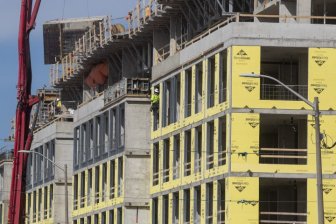When Ontario introduced major changes to the fees developers pay towns and cities when they build new homes, the government was met with fierce and immediate backlash.
Municipalities said new rules, introduced under Bill 23 at the end of 2022, would cost them millions and lead to massive property tax increases for residents.
Local leaders rained criticism down upon Queen’s Park: politicians handed out postcards to homeowners claiming tax increases would be the fault of the provincial government and staff wrote reports suggesting large-scale cuts would be necessary.
Feeling the heat, Ontario Premier Doug Ford and then-housing minister Steve Clark launched audits of a select few cities and promised that they would be made “whole” if they discovered losses.
Audits were announced for Brampton, Caledon, Mississauga, Newmarket, Toronto and the Region of Peel. The government did not explain why those six had been chosen.
“I’ve spent four years down there as part of the audit committee, the vice-chair, I know there’s waste down at the city,” Ford said on Dec. 1, 2022, referring to his time as a Toronto city councillor.
“We want to work collaboratively with all the cities and municipalities. Our goal, at the end of the day, is to build homes — affordable homes, attainable homes. And we are not going to budge on the development fees.”
What did the cancelled audits find?
The audits began in the summer of 2023 and the first half — a financial analysis of the impacts of Bill 23 — was completed sometime in the fall. Then, without sharing the results of the audits, the government cancelled them.
A spokesperson for the housing minister said part of the reason for cancelling the audits was to improve and refresh relationships with municipalities.
“As a signal of renewed cooperation with our municipal partners, the province terminated municipal audits that were underway in the City of Toronto, Peel Region, Mississauga, Caledon, Brampton and Newmarket,” they said.
What those audits found, however, is a closely guarded secret.
“I was curious to see the results of the audit,” Newmarket Mayor John Taylor told Global News.
“I don’t know if I was looking forward to it because it was really hard to see where the audit was going and what the full audit direction was to the auditors…. I obviously had some concerns with the basic premise of the concept.”
Newmarket and the other municipalities involved in the process were not shown the results of the audits before they were cancelled, nor were they told exactly what had been gathered.
“The City provided all documents and information for the first part on Bill 23 impacts, were advised that we were moving into the second part, but then received notice from the province that the audits were being discontinued,” Mississauga CAO Shari Lichterman said in a statement to Global News.
“We did not see reports that (auditor) EY may have completed as part of this audit.”
A request by Global News through freedom of information laws for the audits was rejected by privacy officials with the Ministry of Municipal Affairs and Housing.
“Access to the record is denied in full pursuant to section 13 of the Act (Advice to government),” officials wrote in a letter. Political staff with the premier’s office and the housing minister did not disclose the records when asked.
In early 2024, Housing Minister Paul Calandra said he cancelled the audits “ostensibly” because several of them were related to the Region of Peel, the dissolution of which Calandra also scrapped.
“When we cancelled the transition of Peel, there was no point in continuing on,” he told reporters on Feb. 21. “We also said we were going to be reviewing Bill 23 and 109, so there would be no point in actually continuing those audits.”
Calandra did not say if the audits showed cities were losing money.
Has Ontario made cities whole?
Some of the concerns raised so vocally by towns and cities were addressed in Ontario’s latest housing bill.
In his most recent proposed law in April, Calandra walked back some of the changes in Bill 23 and another law — Bill 109 — to appease municipalities.
The latest reversal scraps a Bill 23 plan to phase in municipal development charges, something cities had worried gave homebuilders a major discount. Some other costs related to things like studies will also fall to developers again as a result of the proposed new law.
Other changes that came in as part of Bill 23, including a limit on the parkland developers needed to offer to cities when they build new housing, on the other hand, have been left intact.
More on Politics
Calandra’s spokesperson said the latest changes were informed by municipal feedback.
“In December of last year, the government announced that it would be consulting with municipalities on the impacts of previous legislation on municipalities’ ability to fund growth-related infrastructure to support the construction of more homes,” they said.
“As a result of those consultations, the government has introduced proposed changes as part of Bill 185, the Cutting Red Tape to Build More Homes Act to eliminate the five-year phase-in of development charge rates.”
Mississauga’s Lichterman said cities have “not necessarily been fully ‘made whole’” through the latest changes but conceded they “do address some of the major financial impacts” the city worried about.
In Newmarket, Taylor said the changes do not make his city whole but that they “are a significant step in the right direction” for municipalities.
“It is encouraging to see the provincial government responding to municipalities concerns and it is also reassuring to hear other party leaders making commitments to keep municipalities whole if elected,” he said, raising concerns that adding development charges back for some affordable housing types was “conspicuously absent” from the new law.
The Region of Peel said the new bill was progressing but does “fall short of making municipalities financially ‘whole.’”
At Queen’s Park, in the lead-up to the latest housing bill, officials with the Ministry of Municipal Affairs and Housing pointed out how reversals would help municipalities but stopped short of saying the issue was closed.
In mid-April Calandra went further, suggesting he considered the issue settled.
He referenced several recent government policies, concluding that “with all of these changes — including the $1.8-billion infrastructure fund, the $1.2-billion Building Faster Fund — we have listened to our municipal partners and we’re moving forward in a way that I think is much more co-operative and addressing those financial needs that they (raised).”


